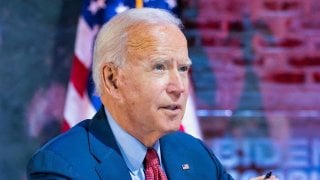Joe Biden Must Resist Donald Trump’s Isolationism
Hand-wringing only strengthens the impulses of America’s isolationists. It is time that the administration pursued an entirely different approach, both internationally and domestically, and it is Biden himself who must take the lead.
As he opened his remarks at the 2007 Munich Security Conference, Russian president Vladimir Putin announced “This conference’s format will allow me to say what I really think about international security problems.” He then went on to attack the United States, arguing that “I consider that the unipolar model is not only unacceptable but also impossible in today’s world,” adding that “the model itself is flawed because at its basis there is and can be no moral foundations for modern civilization.”
Putin went on to assert that “one state and, of course, first and foremost the United States, has overstepped its national borders in every way.” Yet sixteen years later, it is Russia that has done precisely that, invading the sovereign nation of Ukraine. Moreover, in yet another ironic twist, given the revelations of the past few days about Russian military designs in space, Putin pointed out to his Munich audience that “the militarisation of outer space could have unpredictable consequences for the international community and provoke nothing less than the beginning of a nuclear era.”
Despite Russia’s years-long flouting of international norms, Donald Trump, the presumptive Republican candidate for president, and his supporters, both among members of Congress and the wider public, seem indifferent to Russia’s invasion of Ukraine and to the objectives that Putin spelled out unequivocally in his Munich speech. Moreover, Trump has made it clear that America’s commitment to its allies in the face of Russian hostility should hinge solely on how much they spend on defense. As Trump sees it, should they fail to spend 2 percent of their GDP on defense, allies should fend for themselves. And if Putin invades one or more NATO states, that is their concern, not America’s.
Trump’s isolationism, which a growing number of his followers in Congress have come to share and which has the support of his MAGA constituency, is a throwback to the 1930s, when “America First” was the isolationist mantra, as it is once again today. Yet the conditions that permitted Americans of that era to believe they could remain aloof from the rest of the world no longer prevail today.
Two oceans will not protect the United States from an attack on its shores, as they did for over two centuries ever since the British burned the White House in 1814. In the 1930s, no state possessed ballistic missiles capable of flying thousands of miles to attack the United States. No state had developed nuclear weapons that could be mated to those missiles. No state operated satellites in space or developed an anti-satellite capability. No one had heard of the “cybersphere,” much less cyberattacks that could destroy America’s power grid and other infrastructure. The United States may have been invulnerable to foreign attack nine decades ago; it is no longer invulnerable today.
The Biden administration has only recently begun to confront Trump’s isolationist impulses, due in no small part to the growing sense among America’s allies that Washington’s days as the fulcrum of their common defense are numbered. It is true that the White House, to its credit, publicized the impending Russian invasion of Ukraine and identified it as a threat not only to the NATO allies but to its own national interests. Nevertheless, Washington’s provision of arms to Ukraine has consistently been delayed by excessive White House self-deterrence, much to the frustration of America’s European allies. Hand wringing likewise has accompanied the administration’s slow and thus far ineffectual response to Iran’s use of proxies to attack American forces, commerce, and interests throughout the Middle East.
Hand-wringing only strengthens the impulses of America’s isolationists. It is time that the administration pursued an entirely different approach, both internationally and domestically, and it is Biden himself who must take the lead. To begin with, the president should become far more personally involved in negotiations with Congress over the supplemental bill that would fund desperately needed military and economic assistance to Ukraine as well as support for Israel and Taiwan. He should meet with key leaders of both parties as often as necessary until he has the votes to pass the legislation. In addition, he should order the immediate release of longer-range ATACMS, fighter jets, and other weapons for which Ukraine’s President Volodymyr Zelensky has pleaded for more than a year. He should also tighten sanctions on Iran and order an immediate strike on Tehran’s petroleum infrastructure in response to any future attack by Iran or its proxies on American forces or commerce.
At the same time, Biden should attack the isolationists head-on. Like Cato the Elder, the Roman statesman whose speeches in the Senate ended with “Carthage must be destroyed,” Biden should seize every opportunity to explain why modern military technology renders isolationism a danger to the safety of all Americans. He should do so at length in his State of the Union address. He should do so in a special series of televised addresses from the Oval Office. And he should do so whenever and wherever he delivers remarks to whomever his audience happens to be.
The Japanese attack on Pearl Harbor proved the isolationists wrong. Biden should not wait until a cyber attack or a missile attack proves them wrong again. He must act now to support our allies. And he must speak out now to protect the American people from Trump’s worst instincts and those of his many followers.
About the Author
Dov S. Zakheim is Vice Chairman of the Foreign Policy Research Institute, a Senior Advisor at the Center for Strategic and International Studies, and a member of The National Interest Advisory Board. He is a former Under Secretary of Defense and Deputy Under Secretary of Defense.
Image: Shutterstock.com.


